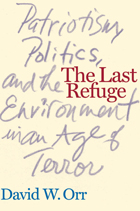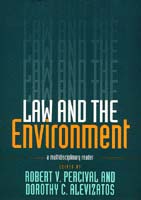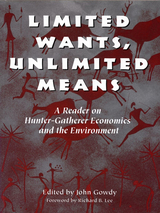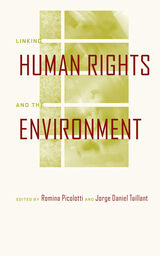4 start with L start with L

"Patriotism is the last refuge of scoundrels" -SAMUEL JOHNSON, 1775
Updated and revised following the 2004 elections, The Last Refuge describes the current state of American politics against the backdrop of mounting ecological and social problems, the corrosive influence of money, the corruption of language, and the misuse of terrorism as a political issue.
Setting out an agenda that transcends conventional ideological labels, David Orr contends that partisan wrangling is only a symptom of a deeper dysfunction: The whole political machinery that connects Americans' fundamentally honorable ideals with public policy is broken. The book offers a withering critique of the failings of the Bush administration, supplemented by new essays that look at the national-level dominance of the Republican Party and examine the fallacy that the evangelical right represents a Christian majority.
After analyzing the challenges of reforming the current system, Orr offers an empowering vision of a second American Revolution that peaceably achieves sustainability and charts a hopeful course for forward-looking citizens.

Law and the Environment: A Multidisciplinary Reader brings together for the first time some of the most important original work on environmental policy by scientists, ecologists, philosophers, historians, economists, and legal scholars. Each of the book's four parts provides a different focus on the nature and scope of environmental problems and attempts to use public policy to address these concerns. Part I examines how ecology, economics, and ethics analyze environmental problems and why they support collective action to respond to them. Part II examines the history and present state of environmental law, from early attempts to engage the government to current debate over the effectiveness of environmental policy. Part III explores the process by which environmental law gets translated into regulatory policy. Part IV considers the future of environmental law at a time when international environmental concerns have become a major force in global diplomacy and international trade agreements.
In drawing together a wide variety of perspectives on these issues, Robert V. Percival and Dorothy C. Alevizatos offer a comprehensive examination of how society has responded to the difficult challenges posed by environmental problems. The selections provide a rich introduction to the complexities of environmental policy disputes.

For roughly 99% of their existence on earth, Homo sapiens lived in small bands of semi-nomadic hunter-gatherers, finding everything they needed to survive and thrive in the biological richness that surrounded them. Most if not all of the problems that threaten our own technologically advanced society -- from depletion of natural capital to the ever-present possibility of global annihilation -- would be inconceivable to these traditional, immediate-return societies. In fact, hunter-gatherer societies appear to have solved problems of production, distribution, and social and environmental sustainability that our own culture seems incapable of addressing.
Limited Wants, Unlimited Means examines the hunter-gatherer society and lifestyle from a variety of perspectives. It provides a brief introduction to the rich anthropological and sociological literature on non-agricultural societies, bringing together in one volume seminal writings on the few remaining hunter-gatherer cultures including, the !Kung, the Hadza, and the Aborigines. It examines the economics of traditional societies, and concludes with a multifaceted investigation of how such societies function and what they can teach us in our own quest for environmental sustainability and social equality.
Limited Wants, Unlimited Means is an important work for students of cultural anthropology, economic anthropology, environmental studies, and sustainable development, as well as for professionals, researchers, and anyone interested in prehistoric societies, environmental sustainability, or social justice.

Despite the evident relationship between environmental degradation and human suffering, human rights violations and environmental degradation have been treated by most organizations and governments as unrelated issues. Just as human rights advocates have tended to place only civil and political rights onto their agendas, environmentalists have tended to focus primarily on natural resource preservation without addressing human impacts of environmental abuse. As a result, victims of environmental degradation are unprotected by the laws and mechanisms established to address human rights abuses.
This book brings together contributions from human rights and environmental experts who have devoted much of their work to unifying these two spheres, particularly in the legal arena. It presents a variety of issues and approaches that address human rights and environmental links, demonstrating the growing interrelationship between human rights law and environmental advocacy. Its coverage includes reviews of existing international laws and treaties that establish the rights to a healthy environment, an overview of mechanisms that allow both individuals and groups to seek remedy for abuses, and specific cases that document efforts to seek redress for victims of environmental degradation through existing human rights protection mechanisms.
Through examples ranging from water rights to women's rights, this collection offers practical ways in which environmental protection can be approached through human rights instruments. The volume reproduces a legal brief (amicus curiae) filed before an international human rights tribunal making the human rights and environment linkage argument, and includes the subsequent precedent-setting decision handed down by the Inter-American Court on Human Rights recognizing this linkage.
Linking Human Rights and Environment is a valuable sourcebook that explores the uncharted territory that lies between environmental and human rights legislation. More than a theoretical treatise, it argues that human rights activism presents a significant opportunity to address the human consequences of environmental degradation and can serve as a catalyst for inspiring ideas and action in the real world.
READERS
Browse our collection.
PUBLISHERS
See BiblioVault's publisher services.
STUDENT SERVICES
Files for college accessibility offices.
UChicago Accessibility Resources
home | accessibility | search | about | contact us
BiblioVault ® 2001 - 2024
The University of Chicago Press









